- Home
- Naguib Mahfouz
Palace of Desire tct-2 Page 7
Palace of Desire tct-2 Read online
Page 7
Al-Sayyid Ahmad looked back and forth between Kamal and the wardrobe, as though appealing to an invisible person for confirmation of the absurdity of the idea he had just heard. Then he said indignantly, "Really? Have I lived long enough to hear drivel like this? You imply there's a difference between prestige and learning! There's no true knowledge without prestige and wealth. And why are you talking about learning as though it's one thing? Didn't I say that you're young and inexperienced? There are many different types of learning, not just one. Some kinds of knowledge are appropriate for tramps and others belong to the pashas of the world. You need to comprehend this, you ignoramus, before you regret it."
Kamal was convinced that his father had a high regard for religion and consequently for those who made it their profession. Thus he craftily said, "The students who do their advanced training at al-Azhar Mosque don't pay tuition. They become teachers, and no one can despise their fields of learning."
His father gestured scornfully toward him with his chin and said, "Peligion's one thing and men who make a career of it are somethmg else."
Deriving strength from his despair for this debate with the man whom lie had always been accustomed to obey, he replied, "But, Papa, you revere the religious scholars and love them."
In a voice that was a bit sharp, his father said, "Don't mix things up. I revere Shaykh Mutawalli Abd al-Samad and love him. But I would far rather see you a respected civil servant than a man like him, even if you were to spread blessedness among the people, protecting them from evil with amulets and charms…. Every era has its men, but you refuse to understand."
He examined his son to gauge the effect of these words. Kamal looked down and bit his lower lip. He began to blink, while the left corner of his mouth twitched nervously.
"How amazing!" al-Sayyid Ahmad thought. Why did people insist on things that were clearly bad for them? He came close to exploding with anger but remembered that he was dealing with an issue outside the realm of his absolute sovereignty. He suppressed his rage and asked, "But why are you so enamored of the Teachers College, as though it had a monopoly on all learning? What do you dislike about Law School, for example? Isn't it the institution that graduates important people and government ministers? Isn't it the institution where Sa'd Zaghlul Pasha and men like him studied?"
Then with a despondent look in his eyes, he continued in a subdued voice: "And it was the school that Fahmy, may God be compassionate to him, chose after serious thought and reflection. If his time had not come so early, he would be a public prosecutor or a judge today. Isn't that so?" Kamal replied emotionally, "Everything you say is true, Papa. But I don't want to study law."
The man struck his hands together and said, "He doesn't want to! Of what relevance to learning and institutions are likes and dislikes? Tell me what attracts you to the Teachers College. I want to know which of its alluring beauties has caused you to fall for it. Or are you a person who loves worthless things? Speak. I'm all ears."
Kamal squirmed, as though summoning all his forces to help him clarify the point his father found so obscure. He realized he had a difficult task before him. He was convinced that his efforts would only earn him more of the sarcastic commentshe had already experienced during their argument. Moreover, he did not see himself as having a clearly defined goal he could explain to his father. What could he say? If he thought a little, he would know what he did not want. He was not interested in legal studies, economics, geography, history, or English, although he appreciated the importance of the last two subjects for his pursuits. If he did not want these, what did he desire? The yearnings of his soul would require careful scrutiny before his goals could be ascertained. Perhapshe was not convinced that he could achieve them at the Teachers College but thought this institution the shortest route to them. These yearnings had been aroused by thingshe had read that could not be classified under a single heading. There had been literary and social essays, religious ones, the folk epic about Antar that heroic black poet of ancient Arabia, The Thousand and One Nights, a medieval anthology of Arabic poetry called al-Hamasa, the writings of al-Manfaluti, and the principles of philosophy. His aspirations were probably connected in some way as well to the realm of fantasy Yasin had disclosed to him long ago and even to the legends his mother had poured into his spirit before that. He was pleased to apply the name "thought" to this mysterious world and the title "thinker" to himself. He believed that the life of thought was man's loftiest goal, rising with its luminous character high above the material world. It was superior to prestige, titles, and all other counterfeit forms of greatness. The life of thought was certainly along those lines even if its features were not clearly delineated. He might find it in the Teachers College or his training there might merely be a means of advancing toward it, but he would never turn away from this goal.
It was only fair to acknowledge the strong link connecting the Teachers College to his heart or more precisely to his love. Why was that? There was no link between his beloved and the law or economics, but there were many ties, no matter how slender and concealed, between her and religion, spirituality, morality, philosophy, and other comparable branches of learning that tempted him to drink from their springs. She had similar secret affinities to singing and music. He could hope to gain insight into them through the transport of a musical performance or an outburst of ecstasy. He was aware of all this within him and totally convinced of its truth, but what could he say to his father? Once again he attempted to outfox his father, saying, "The Teachers College trains people in noble sciences like mankind's history, which is full of lessons, and the English language."
As he spoke, his father scrutinized him. Suddenly al-Sayyid Ahmad's feelings of disdain and anger vanished. As though seeing the lad for the first time, he pondered his son's slender build, huge head, large nose, and long neck. He decided that Kamal looked as strange and eccentric as his ideas sounded. The father's mocking spirit was almost amused by this realization, but his affection and love for the boy restrained his sense of humor. He asked himself, 'If his slenderness is a temporary condition and his nose inherited from me, where did he get this amazing head? Isn't it likely that he'll fall prey to someone like me who searches for defects to make the butt of his jokes?"
This upsetting thought increased his affection for his son. When he spoke, his voice sounded calmer, as if he were patiently giving advice: "Knowledge by itself is nothing. The results are what count. The law prepares you for a legal career. All you get from tiistory and its lessons is a miserable job as a teacher. Take time to consider the consequences long and hard". As the tone of his voice became a little sharper, he continued: "All power and might are God's. Lessons, history, and soot like that! Why don't you talk sense?"
Kamal blushed with embarrassment and pain when he heard his father's opinion of the learning and lofty valueshe cherished. His father had brought them down to the level of soot, comparing them to it. His consolation lay in remembering what he had read in defense of thought and its sanctity and the references to people who disdain learning and prefer to search for profit and status.
Oh!.. those authors must have been debating with men just like his father. But not so fast… his father was not one of those stupid people. He was of a grand, distinguished type. He was simply the victim of his time, place, and companions. Would it do any good to argue? Should he try his luck once more, relying on a new stratagem?
"The fact is, Papa, that these disciplines have won the highest respect in advanced nations. The Europeans cherish them and erect statues in honor of persons who excel in them."
Al-Sayyid Ahmad turned his face away, clearly implying: "O God, have mercy". But he was not actually angry. He presumably thought the whole affair a comic surprise beyond his wildest imaginings. When he looked back, he said, "As your father, I want to feel secure about your future. I want you to have a respectable profession. Is there any disagreement about that? What really concerns me is to see you become an esteemed bureaucrat rather
than a wretched teacher, regardless of whether a statue is erected like that of our national leader Ibrahim Pasha with his finger in the air. Glory to God! The longer we live, the more amazing are the things we hear and see. What does Europe have to do with us? You live in this country. Does it set up statues in honor of teachers? Show me a single sculpture of a teacher". Then he asked in a disapproving tone, "Tell me, son, do you want a career or a statue?"
Encountering no response save silence and confusion, al-Sayyid Ahmad said almost sadly, "I don't know how some of the ideas in your head got there. I'm inviting you to become one of the great men who shake the world with their distinctions and rank. Do you have some model you look up to that I don't know about? Tell me frankly what you think so I may set my mind at rest and understand what you're after. The truth is that you bewilder me."
He would take a new step and explain some of his feelings, putting his trust in God. He said, "Is it wrong, Papa, to aspire to be like the author al-Manfaluti someday?"
Al-Sayyid Ahmad said with astonishment, "Mustafa Lutfi al-Manfaluti? May God have mercy on him. I saw him more than once in the mosque of our master al-Husayn, but so far as I know he wasn't a teacher. He was much too distinguished for that. He was one of Sa'd Zaghlul's companions and writers. Moreover, he studied at al-Azhar, not at the Teachers College. And his education at al-Azhar had nothing to do with his greatness. He was a gift from God. That's what they say of him. We are discussing your future and the school you ought to enter. Let's leave God's work to God. If you're a gift from God and attain the greatness of al-Manfaluti, why not do so as a prosecutor or a judge?"
In desperate self-defense, Kamal replied, "I don't want to be as famous as al-Manfaluti. I want to be as cultured as he was. I haven't been able to find any college where I can better achieve my objective or at least lay a foundation for it than the Teachers College. That's why I prefer it. I have no special desire to be a teacher. Perhaps the only reason for accepting this profession is that it's the path open to me for the cultivation of thought."
"Thought?" Al-Sayyid Ahmad remembered a verse from a song composed and performed by al-Hamuli: Thought has strayed. Aid me, tears.
He had loved it for a long time and in the past had frequently recalled it. Was it this kind of thought his son was striving to develop?
He asked with astonishment: "What is 'the cultivation of thought'?"
Kamal was overwhelmed by confusion. He swallowed and said in a low voice, "Perhaps I don't really know". Then, smiling ingratiatingly, he continued: "If I knew, I wouldn't need to study it."
His father asked incredulously, "If you don't know what it is, what grounds do you have for choosing it?… Huh? Are you simply infatuated with a life of humiliation, for no reason at all?"
Kamal mastered his anxiety with great effort and driven by desperation defended his pursuit of happiness: "Cultivated though: is something too great to be easily comprehended. Among other things, it searches for the origin of life and its destiny."
His father studied him for a long time in bewilderment before saying, "For this you want to sacrifice your future? The origin of life and its destiny? The origin of life was Adam, and our destiny is paradise or hellfire. Or has there been some new discovery concerning this?"
"Of course not. I know that. What I meant to say was…"
His father quickly interrupted: "Have you gone mad? I ask you about your future and you reply that you want to know the origin of life and its destiny. What will you do with that? Open a booth as a fortune-teller?"
Kamal was afraid that if he became baffled and fell silent, he would lose and be forced to accept his father's point of view. Drawing on every ounce of courage he possessed, he said, "Forgive me, Papa. I haven't expressed myself well. I would like to continue my study of literature, begun after I passed the preparatory exam. I want to study history, languages, ethics, and poetry. The future is in God's hands."
As though filling in gaps that Kamal had left in his list, al-Sayyid Ahmad shouted with angry sarcasm, "And to study as well the arts of snake charming, puppetry, crystal gazing, and soothsaying. Why not? O God, have pity on me. Have you really been storing up this surprise for me?… There is no might or power save God's."
Al-Sayyid Ahmad became convinced that the situation was far more serious than he had thought. He was at a loss. He began to ask himself whether he had been wrong to allow his son to speak and think freely on this subject. Whenever he had patiently and tolerantly given his son some rope, the boy had dug hisheels in and argued in an even more extreme fashion. The father found himself torn between his tyrannical tendencies and his recognition of a son's right to choose a school for himself. He was solicitous for Kamal's future and reluctant to admit defeat, but in an uncharacteristic way — or, more precisely, one that would have been out of character in the old dayshe finally let reason have the upper hand.
Thus he returned to the debate and said, "Don't be naive. There's something the matter with your mind that's beyond my understanding. I ask God to deliver you from it. The future is not an amusing game. It's your life and the only one you'll ever have. Think about the question for a long time. Law School is best for you. I understand the world better than you do. I have friends from all walks of life, and they all agree about Law School. You're a stupid child and don't know what it means to be a prosecutor or a judge. These are the professions that shake the world. It's within your power to attain one of them. How can you reject all this so cavalierly and choose to be … a teacher?"
KamaL was distressed and angry, not merely at the insult to the honor of teachers but first and foremost for the sake of learning itself, for what he felt was true learning. He did not think well of occupations that shook the earth. He had often found that the writers who inspired him applied derogatory epithets to them, referring, for example, to their counterfeit grandeur and ephemeral glory. Basing his opinion on what they had said, he believed that the only true greatness lay in the life of learning and truth. Thus all manifestations of majesty and pomp seemed spurious and trivial to him. He refrained from expressing this belief for fear of increasing his father's wrath. He said in a sweet and endearing way, "In any case, the Teachers College is a form of higher education."
Al-Sayyid Ahmad reflected for a time. Then despondently and disgustedly he said, "If you don't feel inclined toward the law for some people even enjoy being miserable — choose a respectable school like the Military or Police academies. Something's better than nothing!"
Alarmed, Kamal asked, "Should I go to the Military or Police academies after getting my baccalaureate?"
"What other alternative is there, since you don't have the background for medicine?"
At that moment al-Sayyid Ahmad noticed that light reflected from the mirror was dazzling his left eye. He turned to look at the wardrobe and saw rays of afternoon sunshine slipping into the room via the window, which overlooked the courtyard. They had advanced from the wall opposite the bed to fill a portion of the mirror, showing that it would soon be time to leave for his store. He moved a little to get away from the light. Then he exhaled in a manner revealing how uneasy he was and bringing the bad news or was it good? — that the conversation was about to conclude. He asked glumly, "Isn't there any other school besides these?"
Lowering his eyes in dismay at being unable to satisfy his father, Kamal said, "There's only Commerce left, and I've no interest in it."
Although al-Sayyid Ahmad was annoyed by his son's speedy rejection of that school, he himself felt at best indifferent toward it. He assumed that it only graduated merchants and did not want his son to be a merchant. He had known all along that an establishment like his, although it supplied him with a good living, would not; be able to support as comfortably a son who succeeded him, for the income would have to be shared with his other beneficiaries. Therefore he had not attempted to groom one of his sons to take his place.
But this was not the main reason for his lack of interest in the School of Commerce. The
fact was that he looked up to the civil service and bureaucrats. He perceived their significance and importance in public life. He had observed this personally with his friends who were civil servants and through contacts with the government relating to his business. He wanted his sons to be civil servants and had prepared them for that career. It was no secret to him that businessmen received only a fraction of the respect that government employees did, even if bureaucrats earned less. He shared this bias, although he would not have admitted it out loud. He was pleased by the deference civil servants showed him and fancied himself to have the mind of a bureaucrat or at least one as good. Who else would be capable of being a merchant and also the equal of a bureaucrat? Why did his sons not have a personality like his? Oh, what a disappointment it was! How he had wished in former times to see one of them become a doctor. He had focused his hopes on Fahmy, until he had been told that the arts baccalaureate did not prepare for the School of Medicine. Then he had contented himself with Law School and had looked forward happily to what would follow. Subsequently he had attached his aspirations to Kamal, selecting the arts section for him and dreaming once more of the successful career to follow Law School. He had never imagined that a struggle between his hopes and fate would result in the death of the genius of the family and in Kamal's insistence on being a teacher. How disappointed he felt!
Al-Sayyid Ahmad seemed genuinely sad when he said, "I've given you the best advice I can. You're free to choose for yourself, but you must always remember that I did not agree with you. Think the matter over at length. Don't be hasty. You still have plenty of time. Otherwise you'll regret your bad choice for the rest of your life. I take refuge with God from stupidity, ignorance, and folly". The man dropped his foot to the ground with a motion that indicated he was preparing to rise and get ready to leave the house.

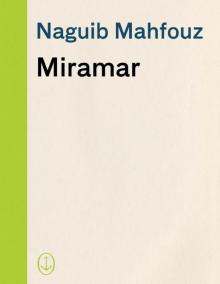 Miramar
Miramar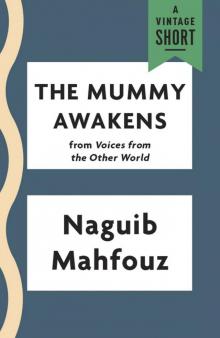 The Mummy Awakens
The Mummy Awakens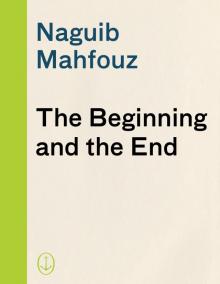 The Beginning and the End
The Beginning and the End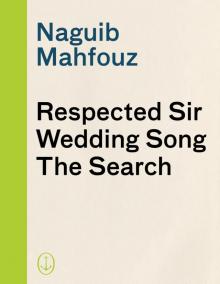 Respected Sir, Wedding Song, the Search
Respected Sir, Wedding Song, the Search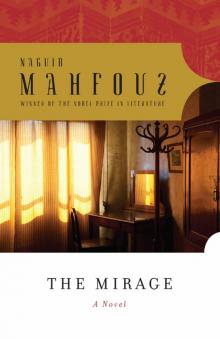 The Mirage
The Mirage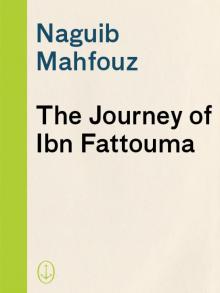 Novels by Naguib Mahfouz
Novels by Naguib Mahfouz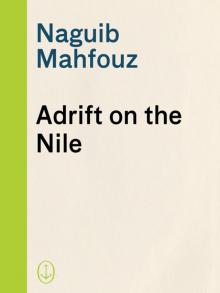 Adrift on the Nile
Adrift on the Nile Karnak Café
Karnak Café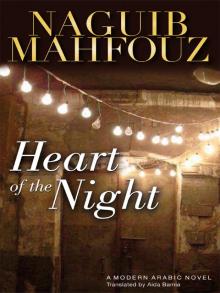 Heart of the Night
Heart of the Night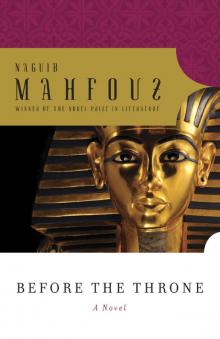 Before the Throne
Before the Throne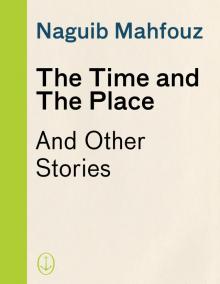 The Time and the Place: And Other Stories
The Time and the Place: And Other Stories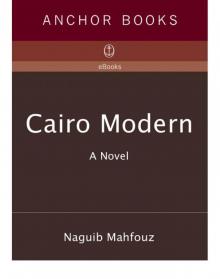 Cairo Modern
Cairo Modern Arabian Nights and Days
Arabian Nights and Days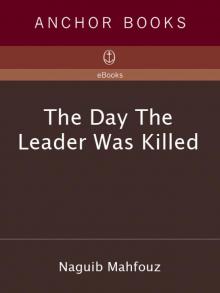 The Day the Leader Was Killed
The Day the Leader Was Killed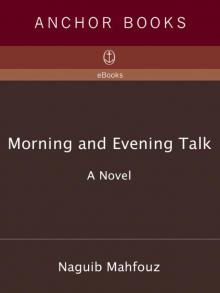 Morning and Evening Talk
Morning and Evening Talk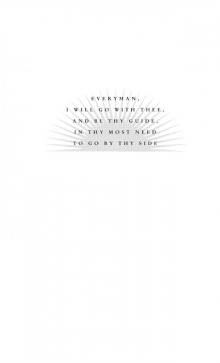 Three Novels of Ancient Egypt Khufu's Wisdom
Three Novels of Ancient Egypt Khufu's Wisdom Akhenaten: Dweller in Truth
Akhenaten: Dweller in Truth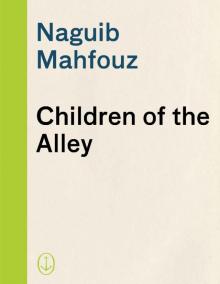 Children of the Alley
Children of the Alley Voices From the Other World
Voices From the Other World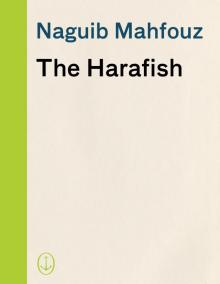 The Harafish
The Harafish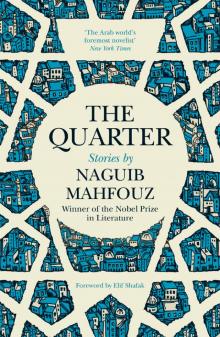 The Quarter
The Quarter The Seventh Heaven: Supernatural Tales
The Seventh Heaven: Supernatural Tales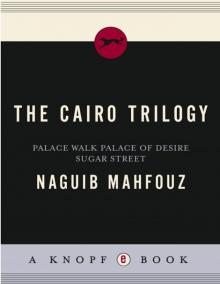 The Cairo Trilogy: Palace Walk, Palace of Desire, Sugar Street
The Cairo Trilogy: Palace Walk, Palace of Desire, Sugar Street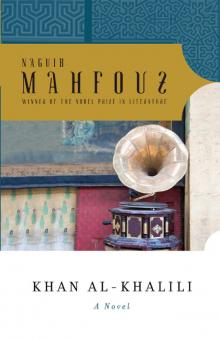 Khan Al-Khalili
Khan Al-Khalili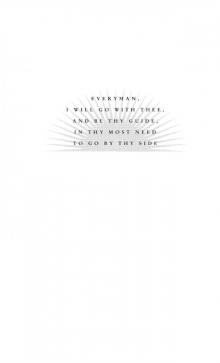 Three Novels of Ancient Egypt Khufu's Wisdom, Rhadopis of Nubia, Thebes at War
Three Novels of Ancient Egypt Khufu's Wisdom, Rhadopis of Nubia, Thebes at War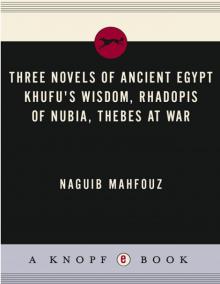 Three Novels of Ancient Egypt
Three Novels of Ancient Egypt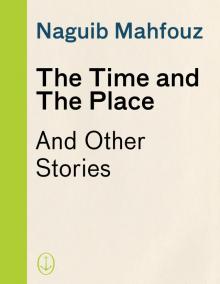 The Time and the Place
The Time and the Place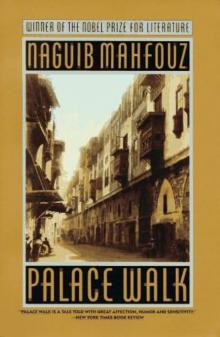 Palace Walk tct-1
Palace Walk tct-1 Akhenaten
Akhenaten The Seventh Heaven
The Seventh Heaven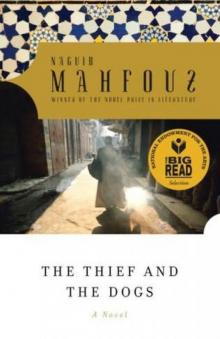 The Thief and the Dogs
The Thief and the Dogs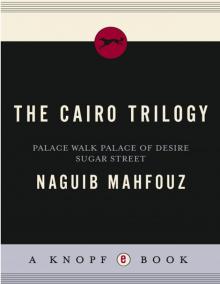 The Cairo Trilogy
The Cairo Trilogy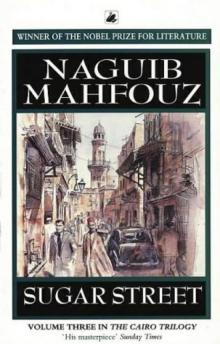 Sugar Street tct-3
Sugar Street tct-3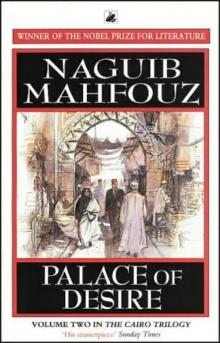 Palace of Desire tct-2
Palace of Desire tct-2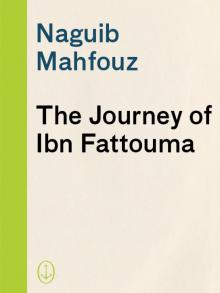 The Journey of Ibn Fattouma
The Journey of Ibn Fattouma